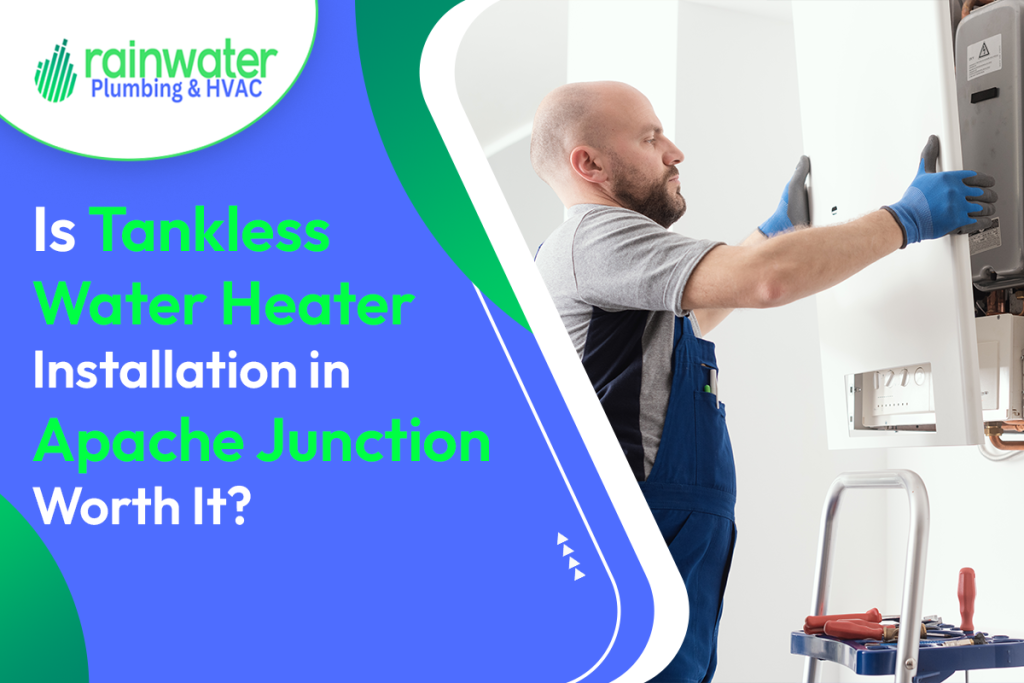Have you ever had your hot shower interrupted by a blast of cold water? It’s frustrating, especially on winter mornings. Many homes in Apache Junction still rely on traditional water heaters that can’t keep up with modern needs. If that sounds familiar, it might be time to consider a tankless water heater.
In this blog, we’ll break down what tankless water heaters are, why more homeowners in Apache Junction are installing them, the pros and cons, and how Rainwater Plumbing makes the installation process smooth from start to finish.
What Is a Tankless Water Heater?
A tankless water heater, also known as an on-demand water heater, heats water only when you need it. Instead of storing a large tank of preheated water, it heats water instantly as it flows through the system. This allows a constant flow of hot water without having to wait or worry about running out. This technology is becoming a preferred choice in Apache Junction homes due to its efficiency and space-saving design.Why Tankless Water Heaters Are Popular in Apache Junction
Apache Junction has a mix of older and newer homes. Many of them have limited utility space or outdated water heating systems. Tankless units are compact and energy-efficient, which makes them a great solution for homeowners looking to upgrade or remodel. Their ability to deliver hot water without delay and without consuming energy when not in use makes them ideal for the desert climate and fluctuating demand patterns seen in local households.Advantages of Tankless Water Heaters
Endless Hot Water
One of the biggest advantages is the continuous supply of hot water. Traditional tanks may run out during long showers or when multiple taps are running. Tankless heaters provide hot water on demand, so there is no waiting time and no cold surprise in the middle of a bath.Lower Utility Costs
Since these systems only heat water when needed, they are far more energy-efficient. This means your monthly gas or electricity bills can see a noticeable drop over time. For families with regular water usage, the cost savings can be significant in the long run.Space Saving
Tankless systems are compact and typically mounted on the wall. This frees up floor space and works well in small utility rooms or tight corners. For many homeowners in Apache Junction, especially those with mobile homes or compact properties, this is a practical upgrade.Longer Lifespan
On average, tankless water heaters can last up to 20 years or more with proper maintenance. This is significantly longer than traditional tank models, which generally last between 8 and 12 years. Fewer replacements mean less stress and lower lifetime costs.Things to Consider Before Installing One
Higher Initial Cost
A tankless water heater usually costs more upfront compared to a tank-style unit. This includes both the unit and professional installation. However, the savings in energy bills and extended lifespan often make it a worthwhile investment.Retrofitting May Be Required
Older homes may need some plumbing or electrical modifications to support the installation of a tankless system. This is especially true if you’re switching from an electric tank to a gas-powered tankless unit or vice versa.Limited Capacity for Large Homes
While the hot water is continuous, the flow rate is limited. Running multiple appliances or showers at once might stretch the capacity of a single unit. For larger families, a professional plumber can help recommend the right model or suggest installing multiple units if necessary.Why Professional Installation Matters
Tankless systems are not plug-and-play. Proper installation involves precise calculations based on your home’s water demand, temperature rise, and the capacity of the local gas or electric supply. At Rainwater Plumbing, we follow a proven process to ensure everything works as intended.Step 1: In-Home Evaluation
Our licensed team visits your property in Apache Junction to assess the layout, measure your water usage, and understand your daily hot water needs.Step 2: Model Selection and Sizing
Based on your usage patterns, we suggest the best model with an accurate gallons-per-minute (GPM) capacity. This ensures your system will not get overloaded even during peak usage.Step 3: Safe and Efficient Installation
We handle all the technical parts, including code-compliant connections, gas line extensions, venting, or upgrading electric service. Once installed, we test the system thoroughly and make sure everything is working properly.Step 4: Education and Maintenance Tips
Before we leave, we walk you through how to operate your new system, set the temperature, and perform basic maintenance tasks to keep the unit running smoothly for years.Maintenance Tips for Longevity
To make the most of your tankless heater, a few maintenance steps can go a long way:- Flush the unit once a year to prevent mineral buildup, especially if your area has hard water.
- Clean filters and check for blockages periodically.
- Keep an eye on any warning lights or changes in water pressure.
- Schedule professional servicing every 1 to 2 years.
When Is the Right Time to Upgrade?
Here are some signs it may be time to consider switching to tankless:- Your existing water heater is over 10 years old.
- You run out of hot water during back-to-back showers.
- Your utility bills are increasing.
- You need more space in your laundry or utility area.
- You want an energy-efficient upgrade that lasts longer.

